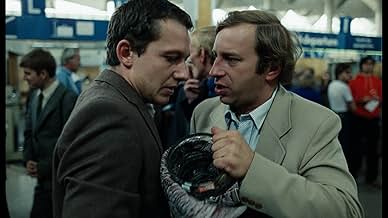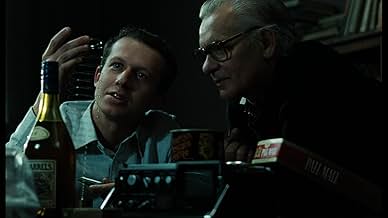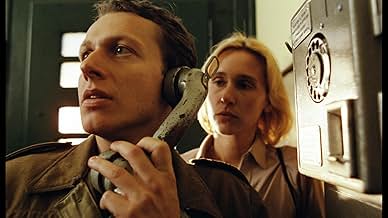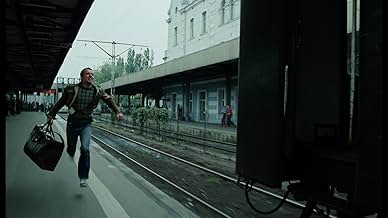Witek corre dietro a un treno. Seguono tre variazioni su come un incidente così apparentemente banale potrebbe influenzare il resto della vita di Witek.Witek corre dietro a un treno. Seguono tre variazioni su come un incidente così apparentemente banale potrebbe influenzare il resto della vita di Witek.Witek corre dietro a un treno. Seguono tre variazioni su come un incidente così apparentemente banale potrebbe influenzare il resto della vita di Witek.
- Regia
- Sceneggiatura
- Star
- Premi
- 2 vittorie totali
Recensioni in evidenza
The only flaw that I can think of is the fact that this film is probably very hard to understand for non-Poles as it is so very... Polish. And although the message the movie tries to convey seems to be more universal, you probably cannot get the whole of it if you were not born in a country located between Russia and Germany.
And if you compare this one to last year Peter Howitt's flick "Sliding Doors"... See how films of similar content can differ?
This film is outstanding and is a must-see for anyone interested in films by Kieslowski and films of this era. It is also a great film for non-film buffs who are interested in the experience of Eastern European Communism.
This movie formats the ethical problems of living under/in Communism better than any professor or history book. You don't have to have an intricate knowledge of communism, ethics, or of post-WWII Polish history to enjoy the film. But you have to follow each scenario closely. You can't doze off or leave the theater. (I would think that the 3-in-1 format alone would be enjoyable for the average viewer--who should be able to clearly delineate the basic dilemmas in each setting.)
Those who did not live in Poland or Central and Eastern Europe can probably not fully relate to the multiple ethical obstacles daily life presented and the existential nature of it all. However, we all have choices to make in our daily lives. Although in a totally different setting, we all must make a choice to join, resist, or withdraw in various stages of our lives.
I would strongly encourage anyone to view this film. I would also encourage the previous reviewer, and any viewer of the film, to watch it more than once.
However, "Blind Chance" is, ultimately, a political film. Although Kieslowski never really considered himself a political film-maker (compared to some of his contemporaries), "Blind Chance" is very much driven by political undercurrents and the outcome of each scenario has a decidedly political aspect. That said, the film transcends the immediate political situation in Poland as well and elevates "politics" to a much broader all-encompassing level. It is really not Polish politics that concern Kieslowski here, but the human being's capacity for taking action. Each scenario presents a possible course of action (or non-action). Kieslowski doesn't seem to endorse one course over the other, but makes a much broader statement about the need to take action, to believe in something, and to fight for something. What one is fighting for, what one believes in, ultimately isn't as important as the fight itself.
A brilliant and highly thought-provoking film. In my opinion, one of Kieslowski's most accomplished and densely-packed works. I hope that anyone who didn't appreciate "Blind Chance" will give it another chance (I've watched it at least ten times). It is not the most accessible film, but the pay-off is worth the effort.
Within the context of the socialist police state of Poland at that time he asks us if we are supposed to fight the system we live in, be part of it and change it from the inside, or whether being happy in life is the one thing we are actually responsible for? In other words, is it worth fighting against everything we don't like? Is accepting it no different from selling out? Should we just try to make the most of it? Kieslowski gives us no answers, which is why this film, as well as all other Kieslowski films I have seen, seems so honest, so true to life. The only honest answer to the hard questions is "I don't know"
The film is also graced with careful, subtle characterizations, beautiful but gritty camera-work, a true comprehension of human emotions as well as of human conflict, and the style and brilliance of a man who truly understands.
I know this: Kieslowski is a master.
Lo sapevi?
- QuizAlthough the movie was made in 1981, it had its premiere in 1987. The delay was because of state-imposed censorship due to the film's political content.
- Citazioni
1. Werner: I intend to give you my current thoughts on an idea I've been committed to for 40 years. Every generation yearns for light. It needs reassurance and faith that the world can be better and a fairer place. This yearning which is older than Marx and younger than Marx, is like a drug. Early in life it brings joy, because the light seems so near and within reach. At life's end it brings bitterness, because the light has grown once again. In these 40 years I've lived through many things and the light seems further away than ever before, and thus I shouldn't encourage you, but you can be sure of one thing: without bitterness and this hope, life would be pitiful indeed.
- Versioni alternativeThe film was scheduled for release in 1981, but was suppressed by the Polish government due to its criticism of Communist regime. The film was eventually released in 1987 with some of the politically sensitive material cut (these cuts totalling roughly 9 minutes). The film has since been released in a uncut form, however one of the scenes involving Witek being beaten by the train guard remains lost.
- ConnessioniFeatured in Arena: The Ten Commandments of Krzysztof Kieslowski (1990)
I più visti
- How long is Blind Chance?Powered by Alexa
Dettagli
Contribuisci a questa pagina


































